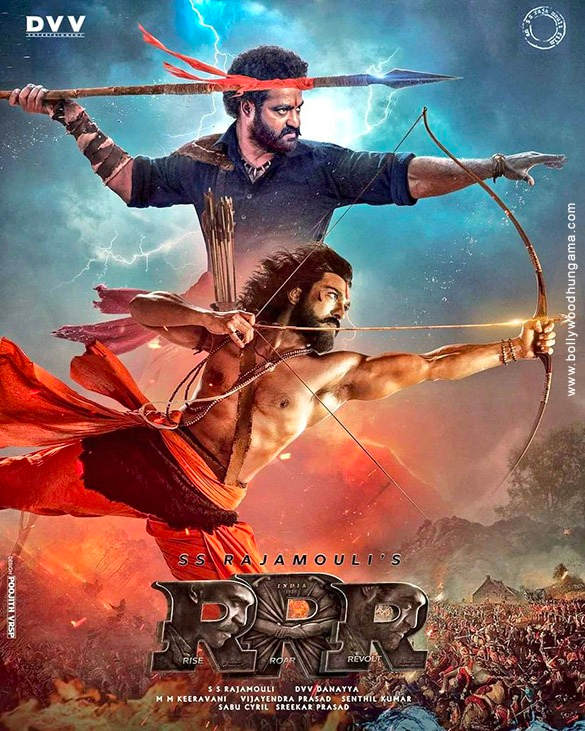RRR
- nickcassidy16
- Nov 9, 2022
- 4 min read
"Your friendship is more valuable than this life, brother." - Bheem

If the theatrically-choreographed sequences of The Matrix, the overdramatized action scenes of Charlie’s Angels, and the bravado-fueled musical numbers of Moulin Rouge had a baby you would get S. S. Rajamouli’s new Indian epic RRR (Rise. Roar. Revolt). A billion dollar industry with the world’s largest film output, Indian cinema’s stamp of larger-than-life storytelling, gaudy sets, song-and-dance routines and melodramatic narratives are echoed flawlessly in Rajamouli’s revolutionary saga. An insane, action-packed roller coaster, RRR provides an equal amount of emotionally charged moral dilemmas as it does jaw-dropping maximalism.
A fictional tale about two real-life revolutionaries, RRR follows Alluri Raju (Ram Charan) and Komaram Bheem (Rama Rao) and their resistance against British tyranny. In the early 1900s, the sadistic ruler of the Delhi province Scott Buxton and his wife Catherine kidnap Malli, a young girl from the Gond forest tribe. The tribe’s guardian, Bheem, has vowed to rescue her by any means necessary, and disguises himself as the muslim mechanic Ahktar in the center of the city. After catching wind of this supposed ruthless shadow of the Gond tribe, Catherine enlists Rama Raju, an audacious officer in the Indian Imperial Police, to thwart his efforts and bring him in alive. Through forces of fate, the two meet, and a loving bond is established that will test everything they stand for. Two otherworldly men, driven by traumatic pasts and prophetic futures: will they burn down the city to defeat each other, or will they come together to take down one of the most oppressive authorities in Indian history?
Rajamouli’s improbable, grandiose display of action sequences and story development–while uniquely perfected on his own accord–is very indicative of Tollywood cinema. What makes the fantastical essence of RRR work so well is the devotion to absurdity. The idea of two men dethroning an entire British government is ludicrous, and Rajamouli trusts the process of building outlandish action scenarios rooted in a realm of cinematic possibilities, rather than our own metaphysical world. On top of exploding palaces, escaping from a high security prison, or one man defeating an entire entourage of soldiers with the help of wild jungle animals, the fighting sequences are choreographed meticulously. Each scene outdoes the one before it, complemented by decisive cinematography and stunning CGI visuals. It is hard to remember a film that devoted such precision to the continuity of every aspect of physical contact.
In the case of RRR, a film saturated with blood and warfare, Rajamouli doesn’t allow these death-defying scenes to represent the soul of the story, rather, he allows them to enhance it. While undoubtedly categorized as a blockbuster action film, RRR at the end of the day is about freedom. Throughout the exposition of varying storylines, Rajamouli emphasizes the inhumane nature the British government bestowed upon the Indian people. While overt racism and systemic persecution might seem an easy starting point for an emotionally rallying storyline, Rajamouli takes it a step further by pitting the two most powerful revolutionaries against each other.
Bheem, a kind-hearted tribal man who has vowed to protect his village, represents water. Rama, a steely, enraged officer who watched his entire village slaughtered, represents fire. Stylizing these two characters in an admittedly amateur juxtaposition drives home the agonizing question, do the ends justify the means? Both undercover and operating for the opposition, Rama and Bheem befriend each other in the streets of Delhi, establishing a deeply connected bromance rooted in cultural symbiosis and mutual respect. The waves of enjoyment felt when the two build this bond come crashing down when sprinkled tides of reality are inserted, an emotional ebb and flow that crescendos to the dreaded moment they will have to choose between each other and the vow to which they’ve devoted their lives. Whether displaying the unspoken loyalty between friends or the innate fidelity to their promise of retribution, Rajamouli implants this moral complication to show the power of the Indian conscience, individually and as a whole.
Taking a subtle, direct approach, the film itself takes on the role of storyteller. Utilizing a score with lyrics explaining expositional elements, graphics and title cards that enhance narrative obstacles, and flashbacks that expose dramatic irony, RRR essentially uses these devices to tell its story. This fictional marvel isn’t pieced together by the audience bit by bit; it isn’t drawn out like stream-of-consciousness; there is no dramatic answer to an unyielding question. It feels like these cinematic elements and these intangible editing and cinematography strings are voices that emulate a third-person omniscient narration-esque oversight without actual communication.
The power of the Indian disposition was one of the central themes throughout the film. Employing Tollywood-centric devices, Rajamouli embodied the cultural importance and resilience of Delhiites. The assimilation of dance routines and singing numbers never deterred from the progression of the plot, adding a measure of emotional depth and entertainment to an already charged script. The almost non-existent white savior complex, and with the inclusion of help from Jenny (a white royal) further strengthened the superhuman, fate-driven capability of Bheem and Rama to unite an entire people. Even a scene with CGI wild animals fighting side by side with Bheem as he stormed the palace was symbolic; every bit of terrain, living being and communal spiritual insight was used as a revolutionary tactic, as if the city of Delhi itself was in defiance of its colonization.
Blockbuster action flicks are often stigmatized as emotionally barren and stunt dependent. RRR doesn’t allow these tropes to stain a film that truly is absolute fun to watch. Every note sung, every punch thrown, every tear shed, unveils a triumphant journey through Indian history. Death defying stunts and pyrotechnics aside, RRR delivers one of the most entertaining films of the year.



.jpeg)
Comments